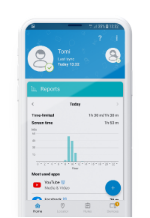Is your child's phone making them sick?
Gadgets provide immense learning opportunities and entertainment, but they have also introduced a new challenge for parents and educators: phone addiction among children.
For parents, keeping kids out of trouble is a never ending struggle. With kids now spending so much of their time online, the phrases “look both ways before you cross the street” and “don’t talk to strangers” have taken on a whole new meaning. So, how do you really know what your kids are up to online? And how can you make sure that your kids stay out of trouble?
As a parent, you know your kids better than anyone. You know best when something is… off. Fortunately, there are a number of behavioral changes that can clue you into your child’s relationship to the internet, social media, and their connected devices.
One example is frequent night-time browsing. You know the old adage, “nothing good happens after midnight?” There’s a reason that so much risky or inappropriate internet usage occurs “after hours”: kids are alone with their devices outside of supervised school or home environments. Fortunately, there are a few best practices you can follow to monitor or even limit this behavior:
We frequently meet parents who were completely unaware that their kids were spending money on in-app microtransactions. This can happen when devices default to the parents’ app store accounts, for instance, or when two-factor authentication for purchases hasn’t been set up (or is intentionally disabled).
A 2020 survey revealed that 31% of parents say their kids spend money on Fortnite. Then there are the horror stories of kids unwittingly emptying bank accounts on in-app purchases. We recommend that you periodically scrutinize your bank and app transaction receipts to make sure there are no surprises.
Ask yourself a few questions:
While we’re hardly advocating that parents create surveillance states in their homes, or an atmosphere of fear, it is important to pay attention to the signs. Again, you know your children best, and there are a few indicators that might tip you off to things like cyberbullying, online grooming, or digital addiction.
First of all, sit down with your child to discuss the potential risks that lurk in cyberspace. Talk to them openly and be honest if you have any suspicions. Educate your children about the kinds of malicious actors that are out there, so that they know how to avoid harm.
Often, these are learning experiences for both children and their parents.
You can also spend some time with children online and let them show you their favorite websites, social media platforms, and apps. Have them show you their favorite things about these channels, how they typically use them, and what their profiles and connections list look like.
If you do opt to monitor device and app usage using parental control software, let your kids know how and why you are doing so. This can help reinforce the guidelines for safe and healthy screen time that your parental controls are designed to enforce and monitor.
To that end, do consider a cybersecurity tool to give you more control over what your child does online. Our own solution, ESET Internet Security, includes robust parental controls for all of your devices. With ESET Internet Security, you can limit the time your child spends playing games or browsing the web, track and limit screen time, and filter certain categories of content.
Yet, this solution is about more than control. It’s about educating children about being safe online and opening a channel for dialog about what content is appropriate for them. Through the application, your kids can have their say on what is okay by requesting permission to access websites that have previously been blocked or ask for extra time to play games or surf the web.
In our experience, working together with children, having open and transparent conversations, is the best way to keep up with what they’re up to online.


With ESET Parental Control for Android
Try free for 30 daysGadgets provide immense learning opportunities and entertainment, but they have also introduced a new challenge for parents and educators: phone addiction among children.
Together with child psychologist Jarmila Tomková, we've prepared some FAQs and common parental worries regarding excessive internet use. Find out why such habits might be problematic—after all, your children might not be the only ones in your household with these habits—and learn how to address and improve them.
Should your child spend all their free time online? Enjoy "Animalia", educational, interactive, animated series about child safety on the internet.